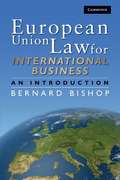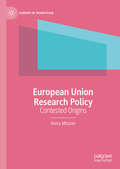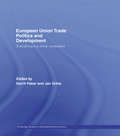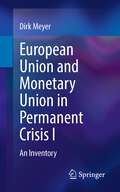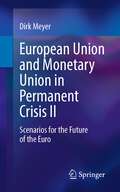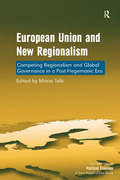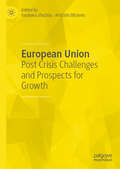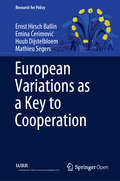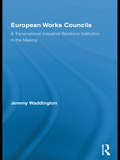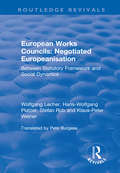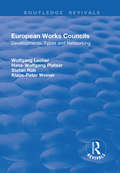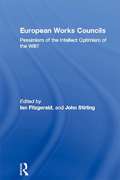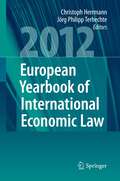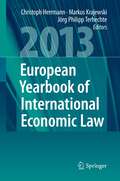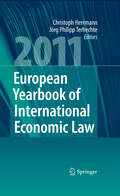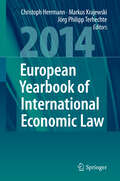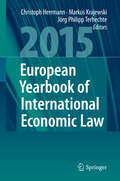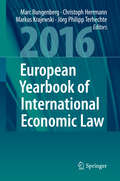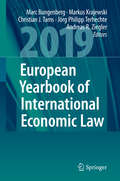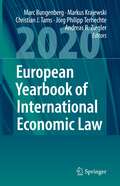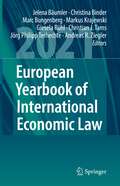- Table View
- List View
European Union Internal Market Law
by Friedl Weiss Clemens KaupaThis is the market's most student-friendly textbook on EU internal market law, covering everything students need to know about the legal and regulatory framework of the internal market and eliminating the need for a full EU law text. Concise and focused, chapters explore the underlying socio-economic and historical contexts of EU law, and offer a thorough examination of the law's technical aspects, ensuring that students gain a rich understanding of the way that legal rules and structures have developed from key political and social debates. Key concepts are illustrated by excerpts, summaries and discussions of classic and modern cases. Numerous features include text boxes, illustrative cases, legal interpretations, tables, and suggestions for further reading, which support students with little background knowledge of the subject, leading them to total mastery of the material.
European Union Law
by Gareth Davies Damian Chalmers Giorgio Monti Damian Chalmers Gareth DaviesAdvocacy organizations are viewed as actors motivated primarily by principled beliefs. This volume outlines a new agenda for the study of advocacy organizations, proposing a model of NGOs as collective actors that seek to fulfil normative concerns and instrumental incentives, face collective action problems, and compete as well as collaborate with other advocacy actors. The analogy of the firm is a useful way of studying advocacy actors because individuals, via advocacy NGOs, make choices which are analytically similar to those that shareholders make in the context of firms. The authors view advocacy NGOs as special types of firms that make strategic choices in policy markets which, along with creating public goods, support organizational survival, visibility, and growth. Advocacy NGOs' strategy can therefore be understood as a response to opportunities to supply distinct advocacy products to well-defined constituencies, as well as a response to normative or principled concerns.
European Union Law
by Gareth Davies Damian Chalmers Giorgio Monti Damian Chalmers Gareth DaviesThis eagerly awaited new edition has been significantly revised after extensive user feedback to meet current teaching requirements. The first major textbook to be published since the rejuvenation of the Lisbon Treaty, it retains the best elements of the first edition - the engaging, easily understandable writing style, extracts from a variety of sources showing the creation, interpretation and application of the law and comprehensive coverage. In addition it has separate chapters on EU law in national courts, governance and external relations reflecting the new directions in which the field is moving. The examination of the free movement of goods and competition law has been restructured. Chapter introductions clearly set out what will be covered in each section allowing students to approach complex material with confidence and detailed further reading sections encourage further study. Put simply, it is required reading for all serious students of EU law.
European Union Law for International Business
by Bernard BishopWritten specifically for exporters and those without legal training, this book is an introduction to the business laws of the European Union that need to be understood by those operating outside the EU. It is a practical guide to the regulatory and procedural issues that exporters and businesses need to be aware of. While providing an overview of how the EU operates as a governing body, the book addresses the key matters that exporters will face during their business transactions. Topics covered include: * Direct export transactions to the EU * Exporting via an agent or distributor * Customs laws and procedures * Resolving international business disputes * How to establish a permanent business presence within the EU The book uses case studies to illustrate how these transaction types can be applied to real world business dealings. This book is an essential resource for anyone involved in international business with customers in the European Union.
European Union Research Policy: Contested Origins (Europe in Transition: The NYU European Studies Series)
by Veera MitznerThis book describes the emergence of research policy as a key competence of the European Union (EU). It shows how the European Community (EC, the predecessor of the EU), which initially had very limited legal competence in the field, progressively developed a solid policy framework presenting science and research as indispensable tools for European economic competitiveness and growth. In the late 20th century Western Europe, hungry for growth, concerned about the American technological lead, and keen to compete in the increasingly open international markets, the argument for a joint European effort in science and technology seemed plausible. However, the EC was building its new functions in an already crowded field of European research collaboration and in a shifting political context marked by austerity, national rivalries, new societal and environmental challenges, and emerging ambivalence about science. This book conveys the contested history of one of the EU’s most successful policies. It is a story of struggle and frustration but also of a great institutional and intellectual continuity. The ideational edifice for the EC/EU research policy that was put in place during the 1960s and 1970s years proved remarkably robust. Its durability enabled the rapid takeoff of the European Commission’s initiatives in the more favorable political atmosphere of the early 1980s and the subsequent expansion of the EU research funding instruments and programs that permanently transformed the European research landscape.
European Union Trade Politics and Development: 'Everything but Arms' Unravelled (Routledge Studies in Development Economics)
by Jan Orbie Gerrit FaberThe ‘Everything But Arms’ (EBA) regulation of the European Union (EU) has been hailed as a groundbreaking initiative for developing countries. Since 2001 EBA grants almost completely liberalized access to the European market for products from the least-developed countries (LDCs). It quickly became the most symbolic European trade initiative towards the Third World since the first Lomé Convention in the 1970s. Given its central position in EU discourse and its continuing relevance for the European and international trade agenda, this book attempts to present a thorough analysis of EBA. ‘European Union Trade Politics and Development’ contains contributions from a diverse range of scholars who collectively present a comprehensive picture of EBA. This volume also contains a broader analysis of EU trade politics towards the South, focusing on agricultural policy reform, Europe’s evolving relationship with ACP countries (ex-colonies from Africa, the Caribbean and the Pacific), it links EBA with Europe’s negotiating position within the World Trade Organization. Contributions to this volume also consider the continuing negotiation leverage of EBA within the Doha Development Agenda, make comparisons with United States trade policy vis-à-vis the LDCs, and focus on the economic effectiveness of EBA in terms of its stated objectives as well as on the institutional skirmishing within the EU.
European Union and Monetary Union in Permanent Crisis I: An Inventory
by Dirk MeyerEuropean integration efforts are on the brink of collapse. In its current state, the European Monetary Union is unintentionally acting more as a dis-integration factor than as a unifying element. Dirk Meyer provides descriptions, analyses and background information on the current crisis. The book is the result of more than ten years of work on the subject.
European Union and Monetary Union in Permanent Crisis II: Scenarios for the future of the euro
by Dirk MeyerThe European Monetary Union based on the Maastricht Treaty doesn’t exist any longer. Permanent rescue parachutes, joint liability and legal presumptions by the EU Commission lead to a fiscal union with a redistributive character. Bond-purchasingprogrammes endanger the independence of the ECB. As an alternative, Dirk Meyer develops a parallel currency concept for a functioning common currency.
European Union and New Regionalism: Competing Regionalism and Global Governance in a Post-Hegemonic Era (The International Political Economy of New Regionalisms Series)
by Mario TelòStemming from an international and multidisciplinary network of leading specialists, this best-selling text is fully updated with new chapter additions. With the first edition prepared at the end of the last century and the second edition adding inter-regional relations, this new edition focuses on competing models of regional cooperation within a multipolar world and the role of European Union. This new edition offers: - A comparative analysis of regional cooperation and of both US-centred and EU-centred interregionalism. - A fresh exploration of key issues of regionalism versus globalization and the potential for world economic and political governance through regional cooperation, notably in hard times. - A vigorous response to conventional wisdom on the controversial EU international identity - An appendix on regional and interregional organizations. - A key resource for postgraduate or undergraduate study and research of international relations, European integration studies, comparative politics and international political economy. Taking into account both the expanded European Union and regional cooperation in every continent, this multidisciplinary volume comprises contributions from established scholars in the field: A. Gamble, P. Padoan, G. Joffé, G. Therborn, Th. Meyer, R. Higgott, B. Hettne / F. Ponjaert, F. Soederbaum, Ch. Deblock, K. Eliassen / A. Arnottir, S. Keukeleire / I. Petrova, S. Santander and M. Telò (editor).
European Union in the 21st Century
by Gunnar TrumbullFocuses on the challenges facing the European Union in 2006. Following the French and Dutch referendums in 2005, the fate of the European Constitution is in jeopardy. Ten new accession countries have just joined the EU, with Turkey in the beginning stages of the accession process. New member states and additional future members have provoked widespread debate on financial, political, and social issues. Growth within the EU has been sluggish, with high unemployment and low investment in R&D. The EU has launched a set of reforms to create a "single passport" system of mutual recognition within the EU for capital, services, and people. Still, terrorist attacks, an upsurge in domestic violence, budgetary problems, and foreign policy, enlargement, and immigration issues plague the EU. In light of these problems, what will be the future of the EU and its constitution?
European Union: Post Crisis Challenges and Prospects for Growth
by Aristidis Bitzenis Vasileios VlachosThis book discusses the unprecedented impact of the financial and economic crisis on government finances and economic performance across Europe, which has raised skepticism on the ability of the current course of integration to promote prosperity. Correspondingly, the European Union is about to contract for the first time in its history. This timely book covers the economic issues that challenge the future of integration in Europe. The chapters are authored by international experts and examine current and emerging challenges and trends for the European Union: economic convergence, monetary policy, competition law, transport policy, the informal sector, employment, recovery and enlargement. Four chapters focus on Greece, which has been the greatest challenge faced by European institutions in the context of the sovereign debt crisis, and one chapter discusses the possible costs of Brexit. The reader will benefit from understanding the key economic challenges, which, if effectively addressed, will lead to deepening the union, or in contrast to a multi-speed Europe.
European Variations as a Key to Cooperation (Research for Policy)
by Huub Dijstelbloem Ernst Hirsch Ballin Emina Ćerimović Mathieu SegersThis Open Access book offers a novel view on the benefits of a lasting variation between the member states in the EU. In order to bring together thirty very different European states and their citizens, the EU will have to offer more scope for variation. Unlike the existing differentiation by means of opt-outs and deviations, variation is not a concession intended to resolve impasses in negotiations; it is, rather, a different structuring principle. It takes differences in needs and in democratically supported convictions seriously. A common core remains necessary, specifically concerning the basic principles of democracy, rule of law, fundamental rights and freedoms, and the common market. By taking this approach, the authors remove the pressure to embrace uniformity from the debate about the EU’s future. The book discusses forms of variation that fall both within and outside the current framework of European Union Treaties. The scope for these variations is mapped out in three domains: the internal market; the euro; and asylum, migration and border control.
European Works Councils and Industrial Relations: A Transnational Industrial Relations Institution in the Making (Routledge Research in Employment Relations)
by Jeremy WaddingtonThe creation of European Works Councils is arguably the most important measure taken in global industrial relations in recent years. Adopted with the primary goal of facilitating European-level workers’ participation in information-sharing and consultation in multinational companies, EWCs have also been central to a wide-ranging process of institution-building at the European level. European Works Councils charts the growth in the number of EWCs and the development of practices associated with EWCs between 1994, when legislation on EWCs was adopted, and 2009, when the initial legislation was amended. Drawing on original, large-scale, survey data, the book shows that the quality of information and consultation is generally poor, thus bringing into question the soft touch legislative approach to employee participation of the European Commission. The reforms implemented within trade union organizations to accommodate the development of EWCs are explored, together with the initiatives taken to extend the role of EWCs beyond information and consultation to incorporate negotiation. Articulation between EWCs and trade union organizations is shown to be integral to EWCs as institutions of information and consultation, and as a means to influence managerial decision-making. Similarly, the development of EWCs is shown to be a process contested by employers’ organizations and managers on the one hand and labour organizations on the other. The character of this contestation ensures that the category ‘EWC’ includes a wide range of institutional forms and practices.
European Works Councils: Between Statutory Framework and Social Dynamics (Routledge Revivals)
by Hans-Wolfgang Platzer Wolfgang Lecher Klaus-Peter WeinerThis title was first published in 2002: Negotiated Europeanisation is the final study in a three-volume series on European Works Councils by an international research group. The first two studies have already been published by Ashgate. The current study is rooted in an analysis of the establishment of EWCs under Articles 5 and 6 of the 1994 EWC Directive. This is now a mandatory procedure and completes the development of EWCs from bodies set up purely by voluntary negotiation to bodies set up within a binding statutory procedure. The study is based on cases of five (named) major European firms in a variety of industrial sectors. As well as a detailed consideration of how negotiations using the mandatory procedure took place, there are more general reflections on the 'quality' of the actors involved, the negotiating process and the outcomes. As well as their analytical value, these observations offer a number of practical pointers on the establishment of information and consultation arrangements internationally. The study also asks why EWCs have been set up in only one third of eligible companies and why the pace of establishing new EWCs slowed after the mandatory procedure came into force in September 1996. This part of the study is based upon a pan-European questionnaire and offers the first empirical findings on this issue. European Works Councils exemplify a new mode of regulation at the European level, not only within industrial relations but in the field of European integration more widely conceived - Europe as a multi-level system of governance within a framework of devolved subsidiarity. This study is of both academic and practical interest, particularly in view of the continuing process of change in this area, exemplified in new Directives on the European Company Statute and information and consultation at national level.
European Works Councils: Development, Types and Networking (Routledge Revivals)
by Hans-Wolfgang Platzer Wolfgang Lecher Klaus-Peter WeinerThis title was first published in 2001. The emergence of the European Works Councils (EWCs) is one of the most important developments in international industrial relations and the most significant intervention by the European Union in the industrial relations field. This volume is the second of three studies into the establishment and operation of EWCs conducted by the authors. It examines the development of a typology of EWCs and explores the prospects for establishing networks of EWCs, using case studies drawn from the food, banking and insurance sectors. The book is an informative text for researchers, academics and practitioners who wish to locate empirical material and practical experience in a developmental and theoretical framework.
European Works Councils: Pessimism of the Intellect Optimism of the Will? (Routledge Research in Employment Relations #Vol. 11)
by Ian Fitzgerald and John StirlingThis book covers the key themes related to the introduction, growth development and future of European Works Councils: the European Works Council Directive itself, European Works Council Agreements, Employers' strategies for managing European Works Councils in practice and trade union strategies for the development of European Works Councils. The book features contributions from key writers in the field and covers both theoretical models and questions of practice.
European Yearbook of International Economic Law (EYIEL), Vol. 3
by Christoph Herrmann Jörg Philipp TerhechteThe third volume of the European Yearbook of International Economic law focuses on two major topics of current academic and political interest. Firstly, it adresses the 10th anniversary of China's accession to the WTO and its implications; secondly, it deals with different legal aspects of global energy markets.
European Yearbook of International Economic Law (EYIEL), Vol. 4
by Markus Krajewski Christoph Herrmann Jörg Philipp TerhechtePart one of Volume 4 (2013) of the European Yearbook of International Economic Law offers a special focus on recent developments in international competition policy and law. International competition law has only begun to emerge as a distinct subfield of international economic law in recent years, even though international agreements on competition co-operation date back to the 1970s. Competition law became a prominent subject of political and academic debates in the late 1990s when competition and trade were discussed as one of the Singapore issues in the WTO. Today, international competition law is a complex and multi-layered system of rules and principles encompassing not only the external application of domestic competition law and traditional bilateral co-operation agreements, but also competition provisions in regional trade agreements and non-binding guidelines and standards. Furthermore, the relevance of competition law for developing countries and the relationship between competition law and public services are the subject of heated debates. The contributions to this volume reflect the growing diversity of the issues and elements of international competition law. Part two presents analytical reports on the developments of the regional integration processes in North America, Central Africa and Southeast Asia as well as on the treaty practice of the European Union. Part three covers the legal and political developments in major international organizations that deal with international economic law, namely the IMF, WCO, WTO, WIPO, ICSID and UNCTAD. Lastly, part four offers book reviews of recent works in the field of international economic law.
European Yearbook of International Economic Law 2011
by Christoph Herrmann Jörg Philipp TerhechtePart one of Vol. 2 (2011) of the European Yearbook of International Economic Law adresses two major topics of current academic debate and public interest: firstly, it focuses on the State and the Global Economy, secondly, on Climate Change and International Economic Law. Part two contains treatises of recent regional integration developments taking place in the major regions of the world. Part three covers the legal and political developments in the major international organizations and fora dealing with international economic policy making. Part four contains book reviews of recent works in the field of International Economic Law.
European Yearbook of International Economic Law 2014
by Markus Krajewski Christoph Herrmann Jörg Philipp TerhechteIn 2014, the global economic system celebrates two anniversaries: Seventy years ago, on 22 July 1944 at Bretton Woods, New Hampshire, the Articles of Agreement of the International Monetary Fund (IMF) and the Articles of Agreement of the International Bank for Reconstruction and Development (Worldbank) were adopted. Since then the global financial and monetary system underwent significant policy changes, but the institutional framework remained the same. More recently, twenty years ago, on 15 April 1994, the Final Act of the Uruguay Round of Multilateral Trade Negotiations was signed and its key component, the Agreement establishing the World Trade Organization, entered into force on 1 January 1995. Even though the beginning of the multilateral trading system dates back to the late 1940s, the founding of the WTO constitutes a significant institutional reform which marks the beginning of a new era. Anniversaries are usually moments of celebration. However, even a superficial observer will notice that neither the current international financial and monetary regime nor the international trade regime is in a stage which invites celebration. Instead, both are facing difficult and fundamental challenges to their very existence from the outside but also from within. So while there may be no time to celebrate, anniversaries are also often used for reflection about the past and the future. Hence, EYIEL 5 (2014) considers these two anniversaries ample moments to reflect on the legacy and the current status of the main two pillars of International Economic Law in its Part one. Part two of EYIEL 5 (2014) brings together contributions on the EU’s Deep Trade Agenda, on Current Approaches to the International Investment Regime in South America, on the Multilayered System of Regional Economic Integration in West Africa and on the Tripartite Free Trade Area, as well as on India and her Trade Agreements. Part three contains treatises of developments in the World Customs Organization, the World Intellectual Property Organization and in International Investment Law. After the book reviews in Part four, EYIEL 5 (2014) is complemented with an Annex containing the Case (on exchange-rate manipulation and crisis-caused guarantees to financial institutions) and the Best Submissions of the 11th EMC2 ELSA WTO Moot Court Competition (of the Harvard team for the complainant and the Leuven team for the respondent). The case not only addresses issues of current interest but also links the subjects of our two special focusses nicely together.
European Yearbook of International Economic Law 2015
by Markus Krajewski Christoph Herrmann Jörg Philipp TerhechteThis sixth volume (2015) of the European Yearbook of International Economic Law puts a particular emphasis on non-tariff barriers (NTBs) to trade and the world trade order. With the steady reduction of tariff rates since the GATT 47 came into force, focus in recent years has been on the vast and complex landscape of non-tariff barriers to trade. States as well as scholars seemingly struggle with the multitude of measures pooled under this expression as there is no single, acknowledged definition of the term, and its relation to the term "non-tariff measures" remains equally blurred. Particularly in practice and on a multilateral level, there appears to be some awkwardness when it comes to coping with NTBs since multilateral trade rules seem to be in conflict with national regulatory autonomy in the pursuit of policy objectives. In part one, this volume sheds light on the problems of non-tariff barriers to trade that arise in various fields. Part two focuses on regional integration with an emphasis on relations between East Asia and the European Union. In this regard, the authors outline the trade and investment relations between the European Union and East Asia, including Japan, Korea and Singapore. Part three offers an overview of recent institutional developments in WIPO, ICSID, WTO and WTO jurisprudence. Part four includes book reviews of recent works in the field of international economic law, and part five introduces a new section on publications in the field of international economic law that were released in 2013 and 2014.
European Yearbook of International Economic Law 2016
by Markus Krajewski Christoph Herrmann Jörg Philipp Terhechte Marc BungenbergVolume 7 of the EYIEL focusses on criticalperspectives of international economic law. Recent protests against free tradeagreements such as the Transatlantic Trade and Investment Partnership (TTIP)remind us that international economic law has always been a politically andlegally contested field. This volume collects critical contributions on trade,investment, financial and other subfields of international economic law fromscholars who have shaped this debate for many years. The critical contributionsto this volume are challenged and sometimes rejected by commentators who havebeen invited to be "critical with the critics". The result is a uniquecollection of critical essays accompanied by alternative and competing views onsome of the most fundamental topics of international economic law. In its section on regional developments, EYIEL 7addresses recent megaregional and plurilateral trade and investment agreementsand negotiations. Short insights on various aspects of the TranspacificPartnership (TPP) and its sister TTIP are complemented with comments on otherdevelopments, including the African Tripartite FTA und the negotiations on aplurilateral Trade in Services Agreement (TiSA). Further sections addressrecent WTO and investment case law as well as recent developments concerningthe IMF, UNCTAD and the WCO. The volume closes with reviews of recent books ininternational economic law.
European Yearbook of International Economic Law 2019 (European Yearbook of International Economic Law #10)
by Markus Krajewski Jörg Philipp Terhechte Marc Bungenberg Andreas R. Ziegler Christian J. TamsVolume 10 of the EYIEL focusses on the relationship between transnational labour law and international economic law on the occasion of the 100th anniversary of the International Labour Organisation (ILO). As one of the oldest UN Agencies, the ILO has achieved considerable progress with respect to labour rights and conditions. The contributions to EYIEL Volume 10 assess these achievements in light of current and future challenges. The ILO’s core instruments and legal documents are analysed and similarly the impact labour standards have on trade and investment agreements. In its regional section, EYIEL 10 addresses recent developments in the US and the EU, including the US’ trade policy strategy towards China as well as the reform of the NAFTA. In its part on institutions, EYIEL 10 focusses inter alia on the role of the rule of law in relation to current practices of the International Monetary Fund and of the WTO’s Appellate Body as an international court. Furthermore, it provides an overview of current cases before the WTO. Finally, the volume entails a section with review essays on recently published books in the field of international economic law and international investment law.
European Yearbook of International Economic Law 2020 (European Yearbook of International Economic Law #11)
by Markus Krajewski Jörg Philipp Terhechte Marc Bungenberg Andreas R. Ziegler Christian J. TamsVolume 11 of the EYIEL focuses on rights and obligations of business entities under international economic law. It deals with the responsibilities of business entities as well as their special status in various subfields of international law, including human rights, corruption, competition law, international investment law, civil liability and international security law. The contributions to this volume thus highlight the significance of international law for the regulation of business entities. In addition, EYIEL 11 addresses recent challenges, developments as well as events in European and international economic law such as the 2019 elections to the European Parliament, Brexit and the EU-Mercosur Free Trade Agreement. A series of essays reviewing new books on international trade and investment law completes the volume.
European Yearbook of International Economic Law 2021 (European Yearbook of International Economic Law #12)
by Markus Krajewski Jörg Philipp Terhechte Marc Bungenberg Andreas R. Ziegler Christina Binder Jelena Bäumler Christian J. Tams Giesela RühlVolume 12 of the EYIEL focuses on “The Future of Dispute Settlement in International Economic Law”. While new forms of dispute settlement are emerging, others are in deep crisis. The volume starts off with reflections on Dispute Settlement and the World Trade Organisation, most prominently the crisis of the Appellate Body, but also addressing international intellectual property law and the African Continental Free Trade Area. This is followed by a section on Dispute Settlement and Investment Protection/International Investment Law, which includes articles on the summary dismissal of claims, the margin of appreciation doctrine, the use of conciliation to settle sovereign debt disputes, and contract-based arbitration in light of Achmea and Hagia Sophia at ICSID. Further contributions consider the emerging role of commercial courts, the dejudicialization of international economic law, dispute settlement in the UK-EU Withdrawal Agreement, reference mechanisms in dispute resolution clauses, and UNCLOS.

